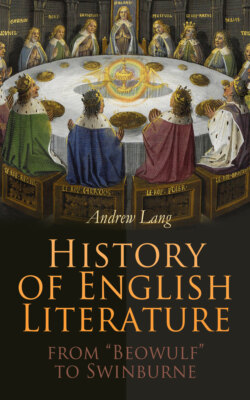Читать книгу History of English Literature from "Beowulf" to Swinburne - Andrew Lang, Robert Kirk - Страница 26
На сайте Литреса книга снята с продажи.
Alfred.
ОглавлениеNot till the kingdom of the West Saxons, Wessex, became the most powerful state in England, and made successful resistance to the Scandinavian invaders, who had destroyed monasteries everywhere, were learning and literature able to raise their heads again. It was the most famous of English kings, Alfred (849-901), that, among all his other labours as warrior and ruler, restored education.
It is unfortunate that so many matters of interest in Anglo-Saxon times are veiled in obscurity. The "Life of Alfred," by Asser, a Welshman, Bishop of Sherborne, is a confused record.
Alfred was certainly taken to Rome by his father at a very early age, but all that is told on this subject is most perplexing. He is said to have been untaught in the art of reading till he was 12 years old, but he heard Anglo-Saxon poems repeated by others, and knew many of them by heart. The famous tale that his mother offered a book of Anglo-Saxon poems to the first of her sons who should "learn it," and that Alfred was taken by the beauty of the illuminations, learned to read, and won the prize, is absolutely unintelligible in Asser's Latin. But Asser says, and Alfred, in his Preface to an Anglo-Saxon translation of Pope Gregory's "Pastoral Care" himself avers, that learning was almost or quite extinct south of the Humber, when his reign began, while in Northumbria matters were little better. But his father's second wife, Judith, was daughter to the Emperor, Charles the Bald, and though Judith, a young girl, was far from being sedate and erudite, the connexion with the Continent enabled Alfred to bring over Frankish scholars, such as Grimbald, while from Wales came Asser, who, for part of each year, lived with Alfred as his tutor.
The king wrote a Handbook, or commonplace book, of Latin extracts, which he translated into his own native tongue; and later he translated, or caused to be translated, the "Pastoral Care" of Pope Gregory; the very popular work on "Consolation" by Boëthius, a philosopher who was slain about 524; the "Church History" of Bede; and a kind of "History of the World" by Orosius, a Christian writer of the fifth century. Of these books, the "History" by Bede was of the greatest value for Englishmen; the "Consolations" of Boëthius are at least as consolatory as any others, and were long popular; while whoever reads Orosius will learn many things, though he will learn them wrong, about the whole history of the human race. Still, the Anglo-Saxon reader became aware of the elements of geography, and of the existence of the powers of ancient Assyria, Egypt, Crete, and Athens, while much space is devoted to the empire of the Amazons.1 "It is shameful," says Orosius, nobly, "to speak of such a state of things, when such miserable women, and so foreign, had subdued the bravest men of all this earth," a conquest which the women repeated, he says, during the Peloponnesian war!
When Orosius reaches Roman history he is much more copious, and not so amusingly incorrect. Alfred, as a rule, paraphrased rather than translated his originals, omitting and adding at pleasure, and amplifying the geography of the North, by information received through Otthere and Wulfstan, contemporary voyagers.
He found learning on its deathbed and he restored and revived it, saving erudition from the natural contempt of men by the royal example of a great statesman, sportsman, and warrior. It was plain to the world that, in spite of the human tendency to despise books, learning was not merely an affair for shavelings in cloisters, for the great king himself loved reading and writing.
